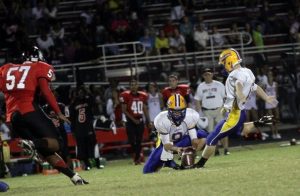
The difference between a successful person and others is not a lack of strength, not a lack of knowledge, but rather a lack of will.
– Vince Lombardi
Organization through automation and delegation is key to success
The sport of American football has its games played on a field called a gridiron. Success on the gridiron requires teamwork, a form of cooperation that forces unselfishness and acts of service to one’s peers. Like this great game, the path to success mimics the path to success in many other facets of life including the game of life, and more to the point, to success in business.
Outside of my work at Imanami, I coach – in multiple sports disciplines (football and wrestling). For more than twenty years I have helped kids in my community prepare for life through the participation in sports. The lessons they learn will carry forward in a positive way throughout their life.
Let me tell you a quick little personal story….
Years ago, as the head coach of a football team, our team was struggling to win a very important game that had post-season implications. The score had gone back and forth throughout the game with neither team dominating the other.
Late in the fourth quarter, an offensive drive from our team was mounted with our team down by two points. As time was wounding down, we found ourselves getting close to scoring field position with no time outs left.
Managing the game was difficult with multiple injuries plaguing the team. As time was nearing expiration, the team reached within scoring distance of the field goal kicker. Quickly, the call went out for the field goal team to take the field as clock slowly ticked down the remaining time left. Within a few short moments the realization that the long snapper was on the sideline – one of many nursing injuries incurred earlier in the game.
With no time outs left and with no quickly identifiable replacement, a delay of game penalty was called. With the penalty assessed, the distance to the goal posts with assured game winning field goal was no longer assured. We were out of the kicker’s normal range.
The replacement snapper took to the field with his teammates. The replacement executed what was a slow and low snap, the holder had to adjust, the kicker made an awkward approach to the ball and swung his foot through the air. The ball’s trajectory was low but ball was hit hard. The ball soared but fell short of space above the horizontal bar of the goal post and it hit the large bar with the sound of a large clang and bounced back towards the field. No score.
Our kicking team lowered their heads as they walked off the field and the opposing team with no time left, arms raised, ran off the field victorious.
Post analysis of the game revealed a few important aspects that needed improvement. The first thing that was realized is that there was a lack of ownership and organization. A properly designed team organization will have plans and failsafe measures for such scenarios as an injured player. There are depth charts that hieratically reflect the order in which someone fills in for an injured player. There are individuals (assistant coaches and coordinators) who are responsible for various phases of the game. This includes a single owner and perhaps an additional backup owner who has the specific responsibility to oversee and manage the kicking game. Each of these athletic resources are grouped or listed together. The realization that these forms of organization are much like that found in business. Accurate groups or lists of people with responsible party seems to prevail all successful organizations.
As many may know, I spend a great portion of my time within Imanami helping other companies identify weaknesses in their identity management strategies. In my consultations, I am like a visiting coach to someone else’s team… helping them recognize weaknesses in their game plan, guiding organizations through the process of implementing new game day strategies that are known to be winning ones. Sharing with them, the knowledge collected by Imanami from years of experience in preparing organizations for their next game challenge. After all, business, like life and football, is a game we all want to win.
CIOs, you are the head coach of your team. You lead by example, you offer up words of praise when deserved, and take corrective action when things go awry. You arrange groups of people into teams that focus on specific tasks. You give team leaders delegated responsibility to ensure that those tasks are fulfilled. You work continuously to get the most out of the resources you have.

IT directors and managers, you get direction from your head coach (your CIO). You lead your team in implementing the actual work that needs to get done. You have first-hand knowledge of the challenges that come with actually doing what are sometimes very difficult tasks. You have been entrusted to implement the strategy of your organization and your teammates count on your leadership.
You are the coaching staff and you have to be ready. You have to organize. Without your leadership, the business organization will find itself behind your opponent. Without organizing your groups, you will not be prepared for all situations. Without assigned ownership of each phase of business, each group, each process, you will not have the focus and attention to detail necessary to ensure productivity, security, and timely reaction to fluctuating business climates.
Your internal Active Directory infrastructure is a foundational component of how your business operates. Each group needs to be managed and have an assigned owner. Each person in the organization that needs to be a member of the group that allows them to be productive. To ensure security, they need to be removed from the groups and lists that would give them access to resources that important to their role.

Your Active Directory, the users within, the groups that organize them is your playbook. Without a clearly organized playbook, your business will not be as nearly prepared as you should be for changing game conditions.
A few points to ponder:
- Do you have someone assigned to manage and own every group?
- Are you implementing hierarchal groups that reflect the structure of your organization?
- Have you implemented automation of group membership?
- Are you delegating with oversight, management of groups to the business stakeholders?
If the answer is NO to any of the questions above, please contact us. Let us “coach” you through improvements that can be made. Don’t be the coach that is unprepared for game day. Let Imanami help you be the coach that wins!

Jonathan Blackwell
View ProfileSince 2012, Jonathan Blackwell, an engineer and innovator, has provided engineering leadership that has put GroupID at the forefront of group and user management for Active Directory and Azure AD environments. His experience in development, marketing, and sales allows Jonathan to fully understand the Identity market and how buyers think.


